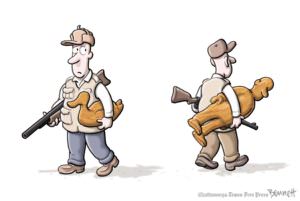Cheney’s Coup
A little-noticed three-year-old executive order vastly expanded the powers of the vice president and illuminates how Cheney and his minions led us into war.Salon:
By Sidney Blumenthal
Feb. 23, 2006 | After shooting Austin lawyer Harry Whittington, Dick Cheney’s immediate impulse was to control the intelligence. Rather than call the president directly, he ordered an aide to inform White House Chief of Staff Andrew Card that there had been an accident but not that Cheney was its cause. Then a host of surrogates attacked the victim for not steering clear of Cheney when he was firing. Cheney attempted to defuse the subsequent furor by giving an interview to friendly Fox News. His most revealing answer came in response to a question about something other than the hunting accident.
Cheney was asked about court papers filed by his former chief of staff, I. Lewis “Scooter” Libby, indicted for perjury and obstruction of justice in the investigation of the leaking of the identity of an undercover CIA operative, Valerie Plame. (She is the wife of former ambassador Joseph Wilson, a critic of disinformation used to justify the invasion of Iraq.) In those papers, Libby laid out a line of defense that he had leaked classified material at the behest of “his superiors” (to wit, Cheney). Libby detailed that he was authorized to disclose to members of the press classified sections of the prewar National Intelligence Estimate on Saddam Hussein’s weapons of mass destruction. (The NIE was exposed as wrongly asserting that Saddam possessed WMD and was constructing nuclear weapons.) Indeed, Cheney explained, he has the power to declassify intelligence. “There is an executive order to that effect,” he said. Had he ever done that “unilaterally”? “I don’t want to get into that.”
Your support matters…Independent journalism is under threat and overshadowed by heavily funded mainstream media.
You can help level the playing field. Become a member.
Your tax-deductible contribution keeps us digging beneath the headlines to give you thought-provoking, investigative reporting and analysis that unearths what's really happening- without compromise.
Give today to support our courageous, independent journalists.




You need to be a supporter to comment.
There are currently no responses to this article.
Be the first to respond.